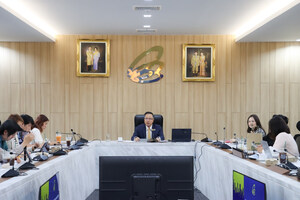Thailand Board of Investment Points Out the High Potential for Thailand to Be Bioplastics Hub
BANGKOK, Jan. 17, 2020 /PRNewswire/ -- Thailand is attracting billions of baht of investments in bioplastics from global and local players seizing the opportunities the country offers as a production hub for bio-based industries due to its abundant raw materials, existing value chain and supportive government policies, the Thailand Board of Investment said.
In the past four years, the BOI approved a total of 15 bioplastics production project worth a total of 16.1 billion baht in investment value, according to BOI data.
"The global market for bioplastics is steadily growing, thanks to increasing demand for eco-friendly products by consumers worldwide, strong support from the public sector and technological innovation from the private and industrial sectors," said BOI Secretary General Duangjai Asawachintachit. "With our strong agricultural base and with Southeast Asia projected to become the world's major bioplastics manufacturing region in the next 10 years, Thailand is well positioned to grow as a bioplastics hub, regionally and globally," she added.
Thailand grows a wide range of agricultural products, including around 30 million tons of cassava a year, a commodity for which it is the world's top exporter. As for supporting industries, Thailand currently has thousands of companies covering various stages of the bioplastics value chain.
The opening, in September 2019, of the world's second largest PLA (Poly Lactic Acid) plant by Total Corbion PLA (Thailand) Ltd., a joint venture between French energy group Total and Amsterdam-based biochemicals company Corbion, represented another important step in the development.
"It's an important contribution to the sector as it adds to other bioplastic makers already invested in Thailand, including international companies such as Mitsubishi Chemical Corporation, as well as local and regional players," Ms Duangjai said.
The Total Corbion PLA factory, which is located at the Asia Industrial Estate in Rayong Province, has a production capacity of 75,000 tons per year of PLA, a versatile biopolymer with a low carbon footprint, using renewable resources such as sugar cane as raw materials.
PTT MCC Biochem, a joint venture between Thailand's PTT Global Chemical PCL, and Japan's Mitsubishi Chemical Corporation (MCC), has also received BOI's investment incentives for its production facility in Rayong. The plant of a biochemical called bio-butanediol (BIO BDO) made from raw materials including raw sugar and cassava.
With the growing trend towards circular economy, bioplastics is seen by many as a sustainable alternative to chemically produced plastics, as they help limit the use of fossil resources and reduce the emission of CO2 and greenhouse gases.
The global bioplastics production capacity is set to increase from around 2.1 million tonnes in 2019 to 2.4 million tonnes in 2024, European Bioplastics, the European association representing the interests of the industry, said in December.
Application for bioplastics is largely in packaging, but other sectors including textiles, consumer goods, transport and automotive, building and construction also illustrate an increasing share of the global demand for bioplastic materials.
"The trend towards Bioplastics not only boosts economic growth in the manufacturing sector but also agriculture production and the circular economy as a whole," Ms Duangjai said.
The BOI offers a wide range of investment incentives to activities related to the sector to support the manufacture of eco-friendly chemicals and of eco-friendly products. Investment in bioplastics-related projects are granted 8-year corporate income tax (CIT) exemption, import duty exemption for machinery as well as other non-tax benefits.
For more information, please contact:
Thailand Board of Investment
Tel. +66 (0) 2553 8111
Website: www.boi.go.th






Share this article